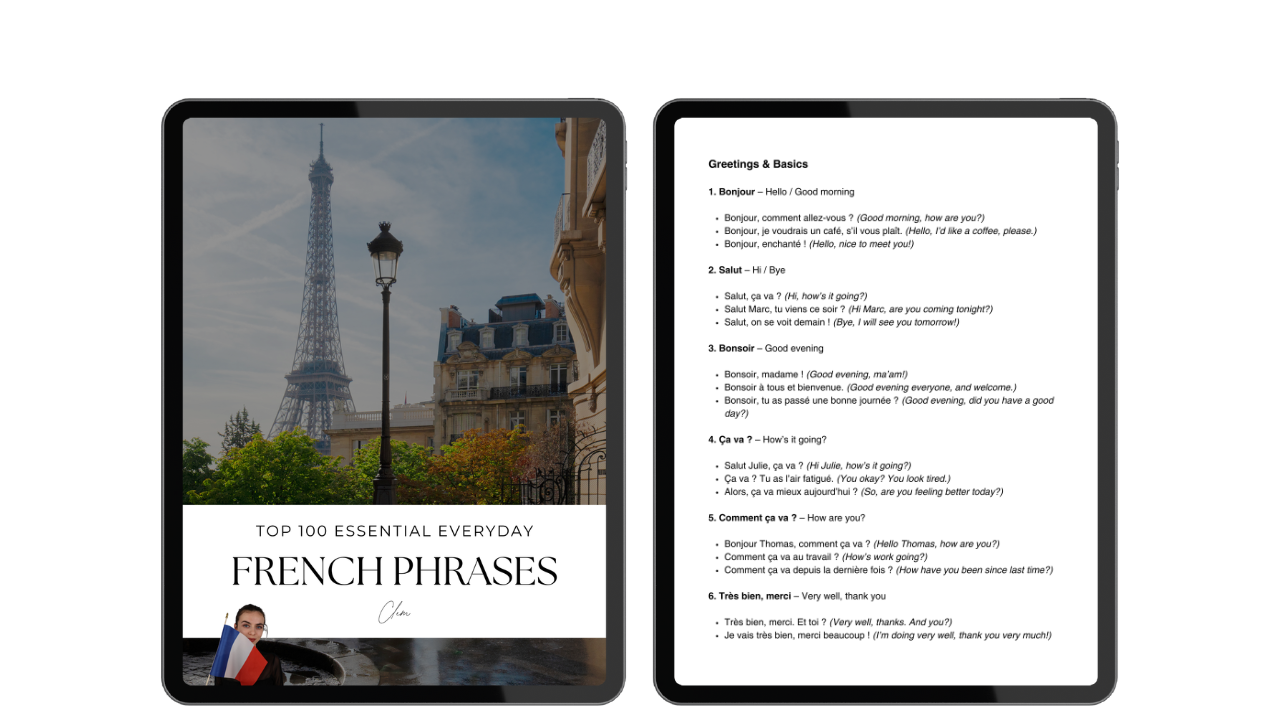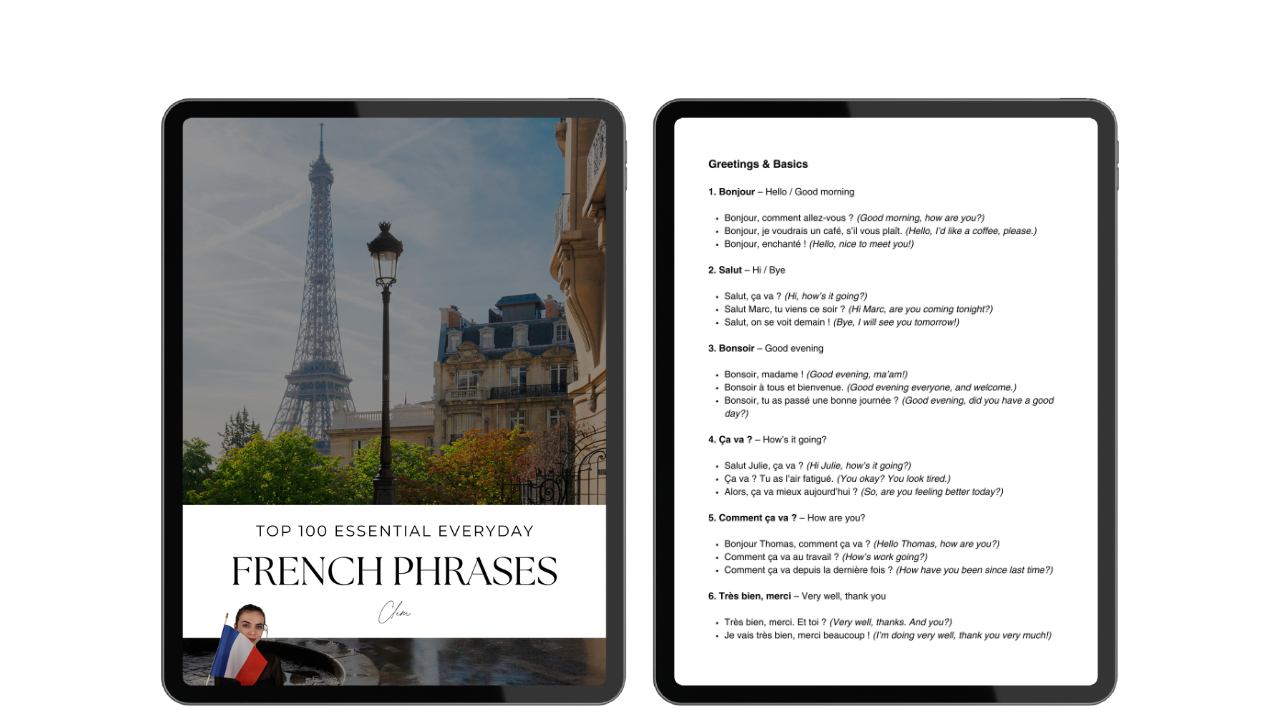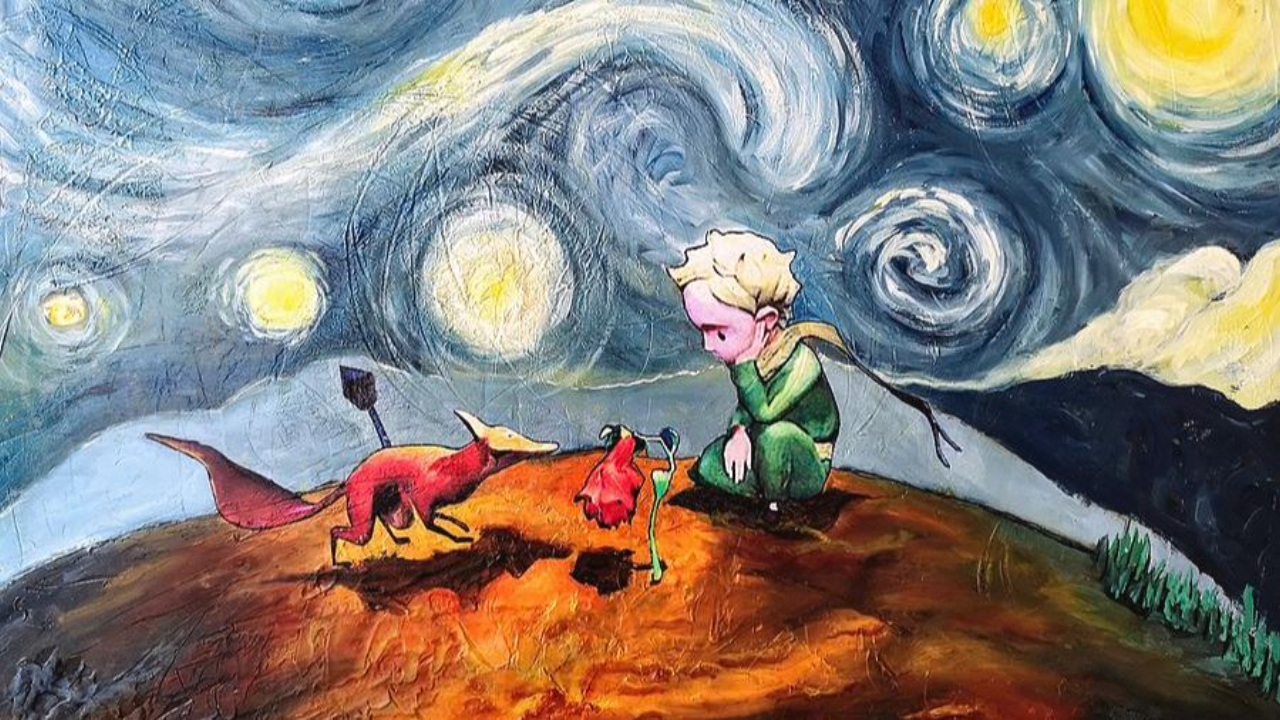
10 Classic French Quotes (and What They Really Mean)
Jun 24, 2025Let’s be real—there’s just something magical about French quotes. Maybe it’s the poetic rhythm, the wisdom tucked into a few words, or the way French just makes everything sound ten times deeper than it really is.
But if you’ve ever seen a French quote floating around Instagram, you might’ve wondered… what does that actually mean? Or even better: Would a real French person even say that?
In this post, we’re going to break down 10 classic French quotes—what they literally mean, what they actually mean, and when (or if!) French people really use them.
So grab your coffee (or a glass of wine—we don’t judge), and let’s dive in.
Also read: 10 French Slang Words You Need to Know
1. « Je pense, donc je suis. »
Translation: I think, therefore I am. – René Descartes, one of the most renowned French thinkers

What it means:
This is probably one of the most famous French philosophical quotes of all time. It comes from the 17th-century philosopher René Descartes, and it basically argues that the very act of thinking proves your existence.
What it really means:
“I’m overthinking again but at least it means I exist.”
It’s deep, yes—but also kind of relatable when you’re lying in bed at 2 a.m. replaying an awkward moment from 2008.
When to use it:
When you’re trying to sound intellectual in a coffee shop or justify your existential crisis.
2. « L’enfer, c’est les autres. »
Translation: This quote from Sartre’s play Huis Clos (“No Exit”) is often summarized by the phrase 'c'est les autres,' meaning 'Hell is other people.' – Jean-Paul Sartre
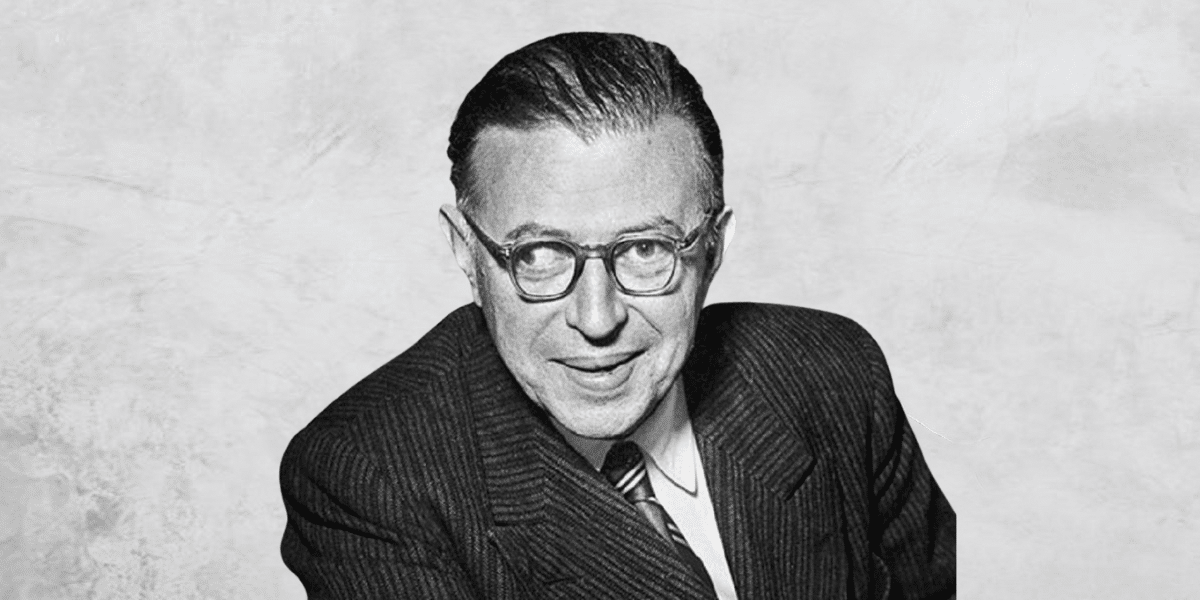
What it means:
This quote from Sartre’s play Huis Clos (“No Exit”) isn’t saying that people are terrible, full stop. It’s more about how being constantly observed or judged by others can feel like a kind of psychological prison.
What it really means:
Sometimes other people’s opinions suck. Especially on social media.
When to use it:
After a long family dinner, or when your group chat starts drama.
3. « Il n’y a pas de fumée sans feu. »
Translation: This is one of the common French sayings that means, 'There’s no smoke without fire.'
What it means:
If there are rumors or signs that something’s going on… there’s probably something going on. It’s the French way of saying, “Where there’s smoke, there’s fire.”
What it really means:
If everyone’s whispering about something, it might not be totally made up.
When to use it:
When gossip is flying and you're pretending you don’t care (but you do).
Learning French? Don’t miss this FREE eBook – Top 100 Essential Everyday French Phrases.
4. « Qui vivra verra. »
Translation: He who lives shall see.
What it means:
It’s a beautifully calm way to say “time will tell.” Instead of stressing out, just wait and see how things unfold.
What it really means:
Let’s not panic about the future just yet.
When to use it:
When your friend is spiraling over an email they haven’t gotten a reply to. Or when your own plans are up in the air.
5. « Vouloir, c’est pouvoir. »
Translation: The phrase 'Vouloir, c'est pouvoir' translates to 'To want is to be able.'
What it means:
If you really want something, you’ll find the power to make it happen. It’s kind of the French version of “where there’s a will, there’s a way.”
What it really means:
Stop making excuses and go for it.
When to use it:
When someone’s hesitating to chase their dream job, move abroad, or finally ask out their crush. You can drop this one and sound super inspiring.
6. « Petit à petit, l’oiseau fait son nid. »
Translation: Little by little, the bird makes its nest.
What it means:
Progress takes time. You don’t need to rush. Just keep showing up, bit by bit, and you’ll get there.
What it really means:
Baby steps are still steps.
When to use it:
Perfect for language learners, gym newbies, or anyone trying to build something from scratch. It’s a gentle reminder that good things take time.
Wondering what’s included in the course? Take a look at the full curriculum.
7. « C’est la vie. »
Translation: That’s life. This one’s everywhere in everyday life, and for good reason.
What it means:
This one’s everywhere, and for good reason. It’s used to shrug off something annoying or disappointing—like a missed train, a failed exam, or an awkward date.
What it really means:
Well… nothing to do but move on.
When to use it:
Whenever life throws something mildly frustrating at you. Just toss out a “c’est la vie” and move on with a French-level sigh.
8. « On ne voit bien qu’avec le cœur. L’essentiel est invisible pour les yeux. »
Translation: This quote from 'The Little Prince' emphasizes that true love involves looking in the same direction, not just at each other. One sees clearly only with the heart. What is essential is invisible to the eye. – Antoine de Saint-Exupéry, The Little Prince
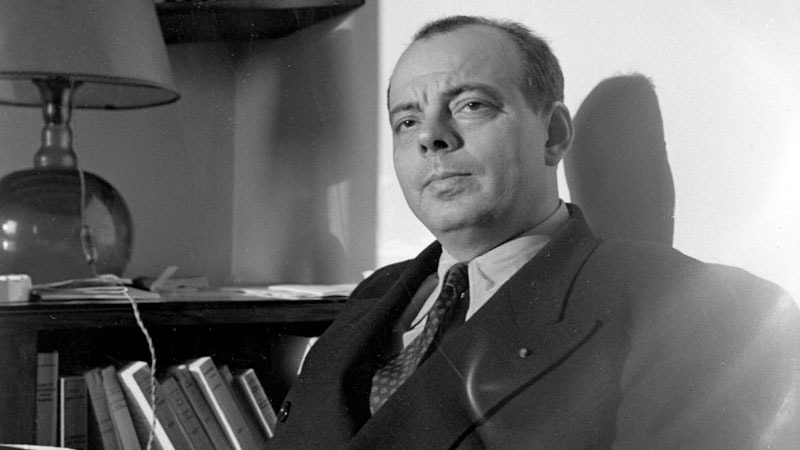
What it means:
This one hits right in the feels. It’s all about how the most important things in life—love, kindness, connection—can’t be seen or touched. You have to feel them.
What it really means:
Stop focusing on superficial stuff and pay attention to what truly matters.
When to use it:
When you’re being a little too obsessed with Instagram likes, or when someone needs a gentle emotional reminder.
You may also like: 50 French Expressions You Need to Know to Sound Fluent
9. « Après la pluie, le beau temps. »
Translation: After the rain comes the sunshine. This saying is the French way of reminding us that nothing is impossible and that tough times will pass.
What it means:
Even the worst moments pass. After a tough time, something good is bound to come. It’s the French way of saying, “This too shall pass.”
What it really means:
Hang in there—it won’t suck forever.
When to use it:
When a friend’s going through heartbreak, work burnout, or just a bad week. It’s reassuring without being too cheesy.
10. « Liberté, égalité, fraternité. »
Translation: Liberty, equality, brotherhood. This motto, deeply rooted in French literature and history, represents the core values of France.
What it means:
This is the official motto of France and a core part of its national identity. It came out of the French Revolution and represents freedom, equality for all, and a sense of community and solidarity.
What it really means:
The French take their values seriously—especially when it comes to justice and personal rights.
When to use it:
This one’s more symbolic than something you’d say casually. But it does pop up in speeches, protests, and on government buildings. And let’s be honest—it sounds pretty epic.
Understanding French Expressions
French expressions are a vital part of the French language and culture. They add a touch of elegance and sophistication to everyday conversations, making them a valuable tool for anyone looking to improve their French skills. With their unique blend of wit, humor, and poetry, French expressions can help you convey complex emotions and ideas in a way that is both nuanced and expressive. Whether you’re a beginner or an advanced learner, understanding French expressions is essential for mastering the language and appreciating the beauty of French culture. These expressions are not just words; they are a window into the French way of life, reflecting the country’s rich history, art, and joie de vivre. So, next time you hear a French expression, take a moment to savor its beauty and the cultural depth it brings to the conversation.
Start your French journey with a FREE Sample Lesson today – Watch Now.
The Power of French Sayings
French sayings, or “expressions françaises,” have the power to evoke strong emotions and convey complex ideas in a way that is both concise and elegant. From the famous “Joie de vivre” to the poignant “Seul être vous manque,” French sayings have a way of capturing the essence of the human experience. By incorporating French sayings into your language learning routine, you can add depth, nuance, and complexity to your conversations, making you a more engaging and effective communicator. These sayings are steeped in history and cultural significance, offering a glimpse into the collective wisdom of French-speaking countries. They remind us that language is not just a means of communication but a reflection of our shared experiences and values. So, embrace these beautiful French sayings and let them enrich your understanding of the world and your place in it.
Inspirational French Quotes
Inspirational French quotes have the power to motivate, inspire, and uplift us, reminding us of the beauty, complexity, and richness of the French language and culture. From the iconic “C’est la vie” to the thought-provoking “Je pense, donc je suis,” French quotes have a way of challenging our assumptions, broadening our perspectives, and inspiring us to live our lives to the fullest. By exploring the world of inspirational French quotes, you can gain a deeper understanding of French culture, history, and philosophy, while also discovering new ways to express yourself and connect with others. These quotes are more than just words; they are a testament to the French spirit of resilience, creativity, and passion for life. Whether you’re looking for motivation, inspiration, or simply a new perspective, French quotes are a valuable resource that can help you navigate the complexities of life with grace and wisdom.
Bonus! A Few More You Might Hear
Couldn’t resist. Here are a few bonus French quotes that are just too good to leave out:
« Mieux vaut prévenir que guérir. »
Better safe than sorry.
Classic advice from moms and cautious people everywhere.
« Il faut souffrir pour être belle. »
One must suffer to be beautiful.
Umm… thanks, fashion industry. This one’s said with a wink (or a groan) when squeezing into skinny jeans or sitting through a long waxing session.
« Chacun voit midi à sa porte. »
Everyone sees noon at their own doorstep.
Basically, everyone sees the world through their own perspective. A poetic way of saying “to each their own.”
So… Do French People Actually Say These?
Good question. Some of them, yes—like C’est la vie, Petit à petit l’oiseau fait son nid, or Après la pluie, le beau temps. You might hear those in everyday conversation, especially from older generations or people who love throwing in a little French wisdom. These quotes are commonly used by those who speak French fluently.
Others—like the quotes from Descartes or Sartre—are more literary or philosophical. You’re less likely to hear someone casually drop those into daily chit-chat unless you’re hanging out with literature students or debating life over wine in Paris.
But that’s part of what makes French so charming: it balances the poetic with the practical, the profound with the playful.
Final Thoughts
French quotes have this beautiful way of saying big things in small ways, making them some of the most beautiful French quotes you can find. Whether they’re packed with emotion, dripping with irony, or quietly wise, they give you a peek into how the French see the world—romantic, resilient, and always a little philosophical.
So next time you come across a French quote, don’t just Google the translation. Ask yourself: What are they really trying to say?
And maybe—just maybe—try slipping one into conversation. Who knows? It might be your new favorite catchphrase.
You’re one step away from learning French the right way.
Join thousands of learners inside my full course and start your journey today → Learn more

